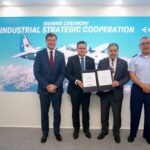Following a three-year competition, the Canadian Space Agency (CSA) announced Vancouver-based Ecoation Innovative Solutions Inc. (Ecoation) as the winner of its Deep Space Food Challenge. As the Canadian grand prize winner, Ecoation will receive $380,000 for their CANGrow Modular Indoor Food Production System, designed to operate in remote environments like outer space and northern regions.
CANGrow uses an innovative approach to producing a diverse range of fresh foods, including strawberries, cherry tomatoes, mycelial meat substitute, etc. With the potential to generate over 700 kg of nutrient-dense food annually, the system maximizes its produce and high-quality protein sources with minimal resources.
The Deep Space Food Challenge, launched in 2021 in collaboration with NASA and Privy Council Office’s Impact Canada, aimed to develop innovative ways of producing food for astronauts on space missions to the Moon and Mars. Members of the jury highlighted the quality of the projects submitted. These solutions could make a real difference in our capacity to sustain long-duration missions in space, while addressing current food production issues in isolated communities on Earth.
Said Canadian innovation, science and industry minister François-Philippe Champagne: “As humanity ventures further into our solar system, new challenges, such as access to nutritious food, will arise for astronauts along their journey. With the Deep Space Food Challenge, Canadian innovators had the opportunity to develop innovative food production solutions to help space explorers that could also apply to people living in remote and harsh environments on Earth. Advances in space science and technology can unlock promising solutions to improve food security on our planet.”
The other Deep Space Food Challenge finalists were a McGill University (Quebec) proposal for crickets as a protein source for astronauts and humans in remote environments; a University of Guelph (Ontario) concept for a controlled environment plant growth chamber designed to produce a variety of fresh fruits, vegetables, and mushrooms; and the AstroYeart Microfarm bioreactor from Concordia University (Quebec).
Pictured is a prototype of the European Space Agency’s Rosalind Franklin Mars rover, being tested in the very harsh, almost Mars-like, Atacama desert in Chile.
Subscribe to the FINN weekly newsletter

